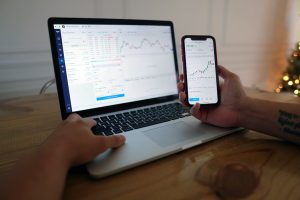Forex trading is a complex field that involves a wide range of concepts and techniques. One of the most important and fundamental concepts in forex trading is the spread. A spread in forex is the difference between the bid price (the price that a buyer is willing to pay for a currency) and the ask price (the price that a seller is willing to accept for a currency). In other words, a spread is the amount of money that a trader pays to buy a currency or receives when selling a currency.
The spread is an essential component of forex trading as it determines the cost of executing a trade. The spread is usually expressed in pips (percentage in point), which is the smallest unit of price movement in a currency pair. For example, if the bid price for EUR/USD is 1.2000 and the ask price is 1.2005, the spread is 5 pips.
The spread is determined by several factors, including the liquidity of a currency pair, the trading volume, and the volatility of the market. Highly traded currency pairs such as EUR/USD and USD/JPY usually have narrower spreads than less traded pairs such as USD/NOK and USD/TRY. Moreover, the spread tends to widen when the market is volatile, such as during economic news releases or unexpected events that affect the market.
The spread is an essential component of forex brokers’ revenue models. Forex brokers earn money by charging traders a commission or by widening the spread. Most brokers use the second method, which involves increasing the spread slightly above the interbank rate (the rate at which banks trade currencies with each other). This difference between the interbank rate and the broker’s rate is known as the markup or the spread markup.
The spread markup varies from one broker to another and depends on several factors, including the broker’s business model, the trading platform, and the type of account. For example, ECN (Electronic Communication Network) brokers usually charge a commission per trade in addition to a narrow spread. In contrast, market maker brokers often have wider spreads but do not charge a commission.
Traders should consider the spread when choosing a forex broker as it can significantly affect their trading costs and profitability. A broker with a narrow spread can save traders money in the long run, especially if they execute multiple trades. However, traders should not base their choice solely on the spread but consider other factors such as the broker’s reputation, regulation, customer support, and trading conditions.
Traders can also use the spread to their advantage by implementing trading strategies that take advantage of the spread’s fluctuations. For example, traders can use a scalping strategy that involves opening and closing multiple trades quickly to profit from small price movements. This strategy requires a broker with a narrow spread and low commission.
Overall, the spread is a crucial concept in forex trading that affects traders’ costs and profitability. Traders should understand the spread, how it is determined, and how brokers use it to earn money. By choosing a broker with a narrow spread and implementing trading strategies that take advantage of the spread’s fluctuations, traders can improve their chances of success in the forex market.





